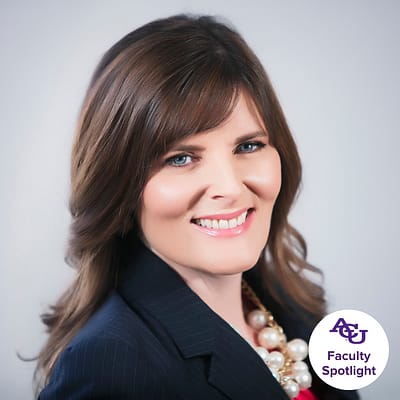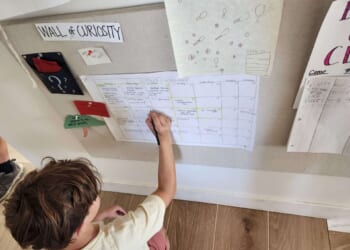 What does it take to shape leaders who inspire meaningful change in education? Dr. Heather Rasmussen is a dedicated faculty member in the Doctor of Education (Ed.D.) in Organizational Leadership program at Abilene Christian University Online (ACU Online), where she blends academic rigor with real-world expertise. With a strong background as a licensed psychologist and a career that bridges higher education and healthcare, Dr. Rasmussen brings a wealth of clinical and academic experience to her students. She has contributed to several large-scale research projects and is highly skilled in positive leadership, resiliency, coaching, crisis intervention, psychological and career assessment, telehealth, online education and positive psychology. Known for her student-focused approach, she actively mentors students and serves on multiple dissertation committees, supporting research that promotes meaningful leadership and organizational change in K–12 schools and universities. Through her guidance, she helps emerging scholar-practitioners develop the skills they need to lead with purpose and resilience, encouraging innovative thinking and impactful educational reform.
What does it take to shape leaders who inspire meaningful change in education? Dr. Heather Rasmussen is a dedicated faculty member in the Doctor of Education (Ed.D.) in Organizational Leadership program at Abilene Christian University Online (ACU Online), where she blends academic rigor with real-world expertise. With a strong background as a licensed psychologist and a career that bridges higher education and healthcare, Dr. Rasmussen brings a wealth of clinical and academic experience to her students. She has contributed to several large-scale research projects and is highly skilled in positive leadership, resiliency, coaching, crisis intervention, psychological and career assessment, telehealth, online education and positive psychology. Known for her student-focused approach, she actively mentors students and serves on multiple dissertation committees, supporting research that promotes meaningful leadership and organizational change in K–12 schools and universities. Through her guidance, she helps emerging scholar-practitioners develop the skills they need to lead with purpose and resilience, encouraging innovative thinking and impactful educational reform.
Heather: The Avid Learner
Before Dr. Rasmussen became a highly credentialed psychologist and professor, she was just an ordinary girl living in a small town just outside of north Missouri. Calling it your typical ‘Friday Night Lights’ kind of upbringing, Dr. Rasmussen remembers thinking about her future. Where would she go? Would she always stay in town? Could she ever leave? Already asking complex and distinct questions, Dr. Rasmussen says she always knew she wanted to work in something that required a curious personality like hers. In high school, she remembers enjoying classes that required her to think critically about herself, the world around her and those she cared about. And like many high school students, she dreamed about going to college. After graduation, Dr. Rasmussen made it into the University of Iowa, where she decided to look at departments that would allow her curiosity to take flight. From film studies to general communications, Dr. Rasmussen focused on obtaining a degree in Communication Studies & Psychology, a sort of best-of-both-worlds combination.
“I never really thought of myself as a communications person or psychologist,” Dr. Rasmussen said. “But, like everything else in my life, I was open to giving it a try. And to be quite honest, that is truly what set me on my path for graduate school and what eventually became my career.”
While at college, Dr. Rasmussen recalls being invited to participate in a media psychology lab where she could interact with students and professors interested in psychological principles and applications. For her, it was like a new world had just opened up: the world of research. Completing her time at the University of Iowa, Dr. Rasmussen searched high and low for the chance to study psychology further in graduate school. After a few interviews, Dr. Rasmussen found herself at the doorsteps of the University of Kansas’s psychology program, where she aimed to focus specifically on counseling psychology for her master’s and doctorate degrees. When asked ‘why counseling psychology?’ Dr. Rasmussen always seems to have one answer: “I like helping people.”
“Counseling psychology’s primary focus is to help people who need professionals that can help them address the emotional, social, vocational, educational, health-related, developmental and organizational concerns in their lives,” Dr. Rasmussen said. “During my time in graduate school, I was asked to work with individuals, couples, families and groups to help them explore and overcome personal challenges they were facing. Unlike clinical psychology, I wanted to study an area that strongly emphasizes holistic development and mental wellness.”
As time went on, Dr. Rasmussen began completing her work in psychology-based areas of research including constructing a forgiveness scale, analyzing workplace culture and even diving into positive psychology. In essence, positive psychology is a branch that focuses on the strengths and virtues that enable individuals and communities to thrive, shifting the focus from problems to well-being and flourishing. Unlike traditional psychology which often focuses on mental illness and dysfunction, positive psychology emphasizes the positive aspects of human experience, such as happiness, resilience and character strengths, which can be applied to several different avenues, from schools to corporations. Deeply interested in the promises of positive psychology, Dr. Rasmussen dedicated her dissertation to aspects of this field and began what ultimately became her lifelong research agenda.
After completing her post-doctoral fellowship for a Cardiovascular Behavioral Medicine project in connection with the University of Pittsburgh Medical Center and Carnegie Mellon University, Dr. Rasmussen began to see the possibilities of working in research and academia. From working as a psychologist and Health Behavior Coordinator at the VA Eastern Kansas Healthcare system, to working as a graduate director at Northcentral University, to ultimately working as an adjunct professor at the University of Kansas, Dr. Rasmussen was starting to notice she wanted to be at a university that allowed her to work from home; one where she could still advance her research and mentor students without needing to juggle multiple projects.
“I had so many great opportunities along the way of my career,” Dr. Rasmussen said. “It just started to weigh on me, and I wanted a little stability for myself and my family.”
Heather: The Innovator
Having a few connections at various online universities came in handy for Dr. Rasmussen when she started looking for a job that could allow her to stay in one location for longer. After calling a few professors who worked in various schools and programs, including ACU Online, Dr. Rasmussen decided she wanted to interview with ACU Online. After a few conversations, she was offered a job within the Doctor of Education (Ed.D.) in Organizational Leadership program.
Over the next few months, she started to ask herself what she could do to best serve the department from a curriculum standpoint. Wanting to use her expertise in psychology, and after speaking with some of her students and colleagues, she came to the conclusion that the program needed to look into a concentration focused on aspects related to positive psychology and leadership. Within a matter of months, and through loads of prayers and discussions, the department had finally done it – a positive leadership concentration was launched, which focused on examining the outcomes, processes and attributes that take leaders beyond their roles and into thriving and excelling positions in order to strengthen their organizations, schools and companies.
“It was really exciting to work with my colleagues on this concentration because of how applicable it can be for our students, who are interested in putting these practices and principles into practice,” Dr. Rasmussen said. “So, when we got the go-ahead, it felt like we not only contributed to the growing Ed.D. degree program but also can now utilize our expertise, our life’s work, for our students and their academic success.”
Today, Dr. Rasmussen sees herself as the ultimate cheerleader for her students. Committed to helping students meet their academic goals while becoming change agents in their fields, she provides thoughtful feedback, fosters critical thinking and models values-based leadership in every interaction. In more than one way, her ability to combine clinical knowledge with educational strategy makes her one of the most sought-after and respected voices in the program. While there is still a lot of work ahead of her, Dr. Rasmussen believes in the power of education to transform lives and systems. As she continues to inspire and equip the next generation of leaders through her teaching, research and student support, Dr. Rasmussen is excited to see how the program will continue to grow for years to come.
Interested in learning more about the positive leadership concentration or our growing Ed.D. in Organizational Leadership? Visit our website today to see how you can get started.







